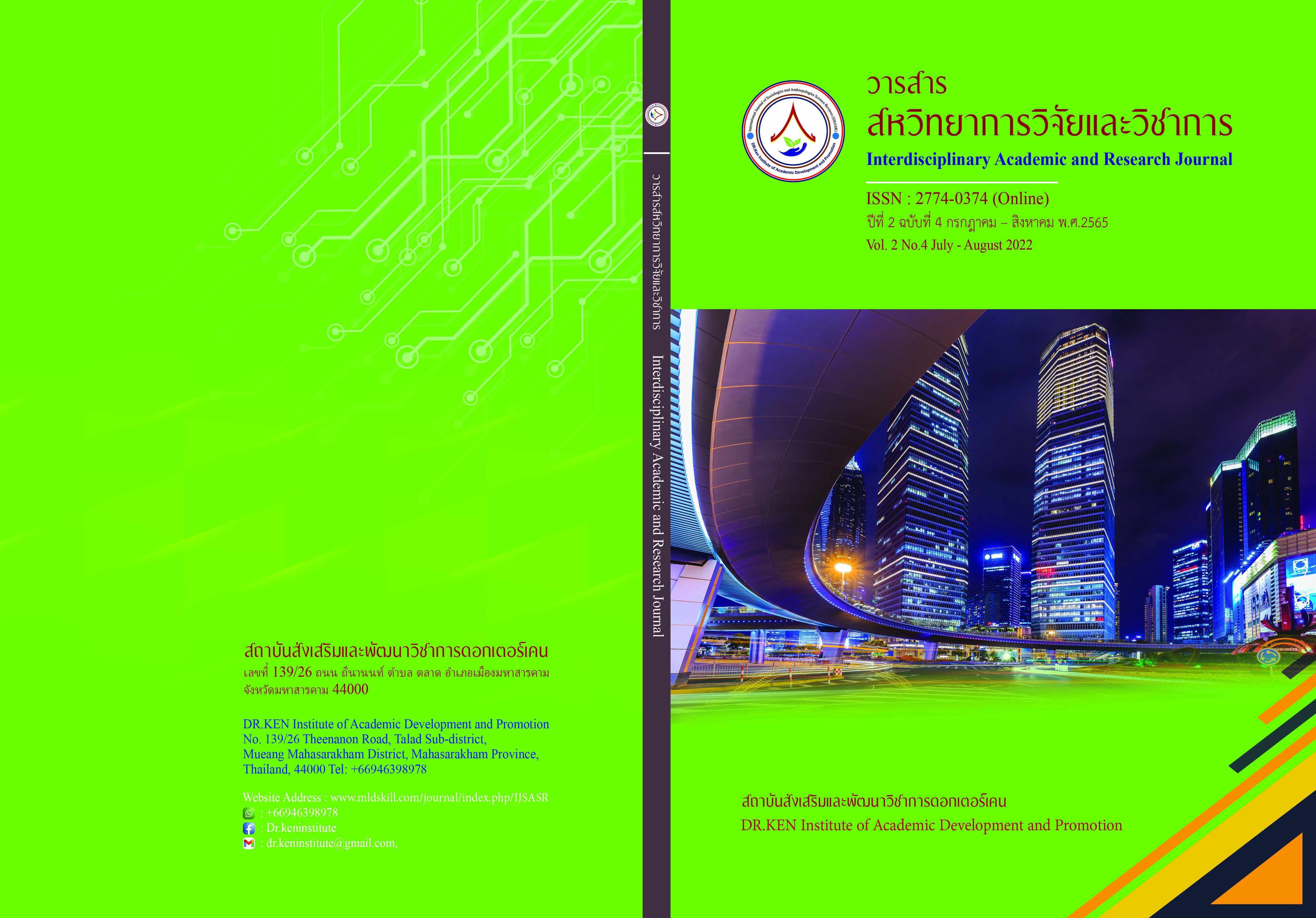Service Innovation Affecting the Success of Using the Food Ordering Application During the COVID-19 Pandemic
DOI:
https://doi.org/10.14456/iarj.2022.68Keywords:
Service Innovation; , Success of Service; , Food Ordering Application;, During the COVID-19 PandemicAbstract
This situation of the COVID-19 epidemic since January 2020. The general public has had problems accessing the restaurant. Therefore online food ordering service through an application was born during the COVID-19 by objectives of this research were (1) to study the general characteristics of service users who order food online through the application during the COVID-19 Pandemic, (2) to study service innovation affecting the success of using the food ordering application during the COVID-19 pandemic (3) to analyze the relationship between service innovation and the success of using the food ordering application during the COVID-19 pandemic and (4) to analyze the stepwise multiple regression equations of service innovation affecting the success of using the food ordering application during the COVID-19 pandemic. The sample group was 400 customers who ordered food online through an application during the COVID-19 pandemic with a purposive sampling method. The tools used for data collection were questionnaires. The statistics used in the research were descriptive statistics such as mean, standard deviation, Pearson’s product-moment correlation coefficient, and multiple linear regression by a stepwise method. The results of the study revealed that most of the service users were female, aged between 18-25 years old, had bachelor's degrees, occupational employees of private companies, had an average monthly income of 20,001–30,000 baht, and service innovation was related to the success of using the food ordering application during the COVID-19 pandemic with statistical significance, including the service concept (β) =0.160, customer interaction (β) =0.062, new services delivery process (β) =0.227 and new technology service (β) =0.165. Therefore, the business owners should adopt service innovation to use in online food ordering services through applications. To make customers satisfied with the business and then come back to use the service next time and make the business successful and sustainable in the future.
References
Adams, R., Bessant, J., & Phelps, R. (2020). Innovation management measurement: A review. International Journal of Management Reviews, 8 (1),21–47. DOI: 10.1111/j.1468-2370.2006.00119.x
Bhaskara, G.I. and Filimonau, V., 2021. The COVID-19 pandemic and organizational learning for disaster planning and management: A perspective of tourism businesses from a destination prone to consecutive disasters. Journal of Hospitality and Tourism Management, 46 (3), 364 - 375. DOI: 10.1016/j.jhtm.2021.01.011
Brewer, P., & Sebby, A. G. (2021). The effect of online restaurant menus on Consumers’purchase intentions during the COVID-19 pandemic. International Journal of Hospitality Management, 94, 102777.
Burnett, M., Johnston, A. (2020). Brexit anticipated economic shock on Ireland's planning for hospitality and tourism: resilience, volatility and exposure. Tourism Review. 75 (1). doi: https://doi.org/10.1108/TR-04-2019-0118.
Cheng. Y.-Y., Chen, C.-T. (2021). Construction of a service quality scale for the online food delivery industry. International Journal of Hospitality Management. 95 (4),102938. DOI: 10.1016/j.ijhm.2021.102938
Choosri, A. (2020). The Service Innovation, Corporate Social Responsibility, and Word-of-Mouth Marketing Affection Decision to Use the Private Hospital’s Inpatient Ward (IPD) in Bangkok. Independence Study of Business. Administration, Bangkok: Bangkok University.
Corpuz, J. C. G. (2021). Adapting to the culture of ‘new normal’: An emerging response to COVID-19. Journal of Public Health. 43 (2), 344–345, Doi: https://doi.org/10.1093/pubmed/fdab057
Dedeoglu, B. B., & Bogan, E. (2021). The motivations of visiting upscale restaurants during the COVID-19 pandemic: The role of risk perception and trust in government. International Journal of Hospitality Management, 95, 102905. Doi: https://doi.org/10.1016/j.ijhm.2021.102905
Den Hertog, P. (2010). Knowledge-intensive business services as co-producers of innovation. International Journal of Innovation Management. 4 (4), 491-528.
Gronroos, C. (2020). Service management and marketing: A customer relationship management approach. 2nd edition, UK: John Wiley & Sons.
Kautish, P., Paul, J., Sharma, R., (2021). The effect of assortment and fulfillment on shopping assistance and efficiency: An e-tail services cape perspective. J. Retail. Consum. Serv. 59 (3), 102393. Doi: https://doi.org/10.1016/j.jretconser.2020.102393
Marasco, A., De Martino, M., Magnotti, F., & Morvillo, A. (2018). Collaborative innovation in tourism and hospitality: A systematic review of the literature. International Journal of Contemporary Hospitality Management; Bradford. 30 (6), 2364-2395. DOI:10.1108/IJCHM-01-2018-0043
McKenzie-Mohr, D. (2000). Fostering sustainable behavior through community-based social marketing. American Psychologist. 55 (5), 531–537.
Ribeiro, G., & Cherobim, A. P. M. S. (2021). Environment and innovation: Discrepancy between theory and research practice. RAI Revista de Administração e Inovação. 14 (1), 30–40. Doi: https://doi.org/10.1016/j.rai.2016.10.002
The Bangkokpost. (2020). The food delivery challenge. [Online] April 10, 2022. Fromhttps://www.bangkokpost.com/business/1965615/delivery-platforms-dig-in-for-war.
Downloads
Published
How to Cite
Issue
Section
License
Copyright (c) 2022 Busara Niyomves, Rungroje Songsraboon, Jitravee Thongtao, Sakulkarn Chaijariyavet, Patitta Opaspong

This work is licensed under a Creative Commons Attribution-NonCommercial-NoDerivatives 4.0 International License.
Copyright on any article in the Interdisciplinary Academic and Research Journal is retained by the author(s) under the under the Creative Commons Attribution-NonCommercial-NoDerivatives 4.0 International License. Permission to use text, content, images, etc. of publication. Any user to read, download, copy, distribute, print, search, or link to the full texts of articles, crawl them for indexing, pass them as data to software, or use them for any other lawful purpose. But do not use it for commercial use or with the intent to benefit any business.
















.png)


